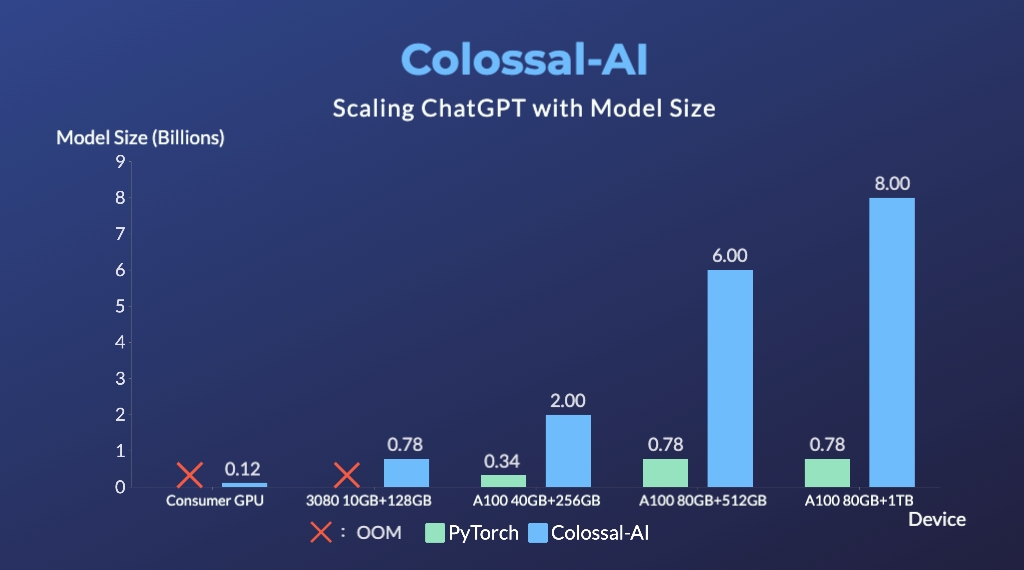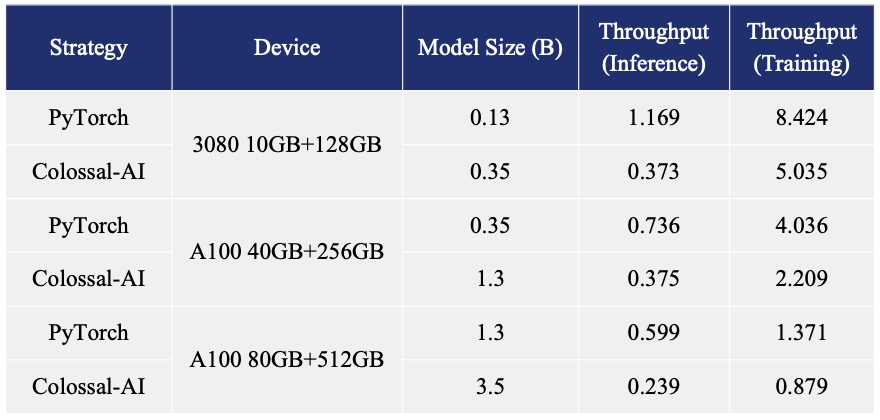|
|
||
|---|---|---|
| .. | ||
| assets | ||
| benchmarks | ||
| coati | ||
| examples | ||
| inference | ||
| tests | ||
| .gitignore | ||
| LICENSE | ||
| README.md | ||
| pytest.ini | ||
| requirements-test.txt | ||
| requirements.txt | ||
| setup.py | ||
| version.txt | ||
README.md
Coati - ColossalAI Talking Intelligence

Table of Contents
- Table of Contents
- What is Coati ?
- Online demo
- Install
- How to use?
- Coati7B examples
- FAQ
- The Plan
- Invitation to open-source contribution
- Quick Preview
- Authors
- Citations
- Licenses
What is Coati ?
Coati is a large language model developed by Colossal-AI, which is also a unified large language model framework that has implemented the following functions
- Supports comprehensive large-model training acceleration capabilities for ColossalAI, without requiring knowledge of complex distributed training algorithms
- Supervised datasets collection
- Supervised insturcts fine-tuning
- Training reward model
- Reinforcement learning with human feedback
- Quantization inference
- Fast model deploying
- Perfectly integration with the Hugging Face ecosystem, high degree of model customization
More details can be found in the blog.

Online demo
You can experience the performance of Coati7B on this page.
Warning: Due to model and dataset size limitations, Coati is just a baby model, Coati7B may output incorrect information and lack the ability for multi-turn dialogue. There is still significant room for improvement.
Install
Install the environment
conda creat -n coati
conda activate coati
pip install .
Install the Transformers
Given Hugging Face hasn't officially supported the LLaMA models, We fork a branch of Transformers that can be compatible with our code
git clone https://github.com/hpcaitech/transformers
cd transformers
pip install .
How to use?
Supervised datasets collection
we colllected 104K bilingual dataset of Chinese and English, and you can find the datasets in this repo
Here is how we collected the data

Stage1 - Supervised instructs tuning
Stage1 is supervised instructs fine-tuning, which uses the datasets mentioned earlier to fine-tune the model
you can run the examples/train_sft.sh to start a supervised instructs fine-tuning
torchrun --standalone --nproc_per_node=4 train_sft.py \
--pretrain "/path/to/LLaMa-7B/" \
--model 'llama' \
--strategy colossalai_zero2 \
--log_interval 10 \
--save_path /path/to/Coati-7B \
--dataset /path/to/data.json \
--batch_size 4 \
--accimulation_steps 8 \
--lr 2e-5 \
--max_datasets_size 512 \
--max_epochs 1 \
Stage2 - Training reward model
Stage2 trains a reward model, which obtains corresponding scores by manually ranking different outputs for the same prompt and supervises the training of the reward model
you can run the examples/train_rm.sh to start a reward model training
torchrun --standalone --nproc_per_node=4 train_reward_model.py
--pretrain "/path/to/LLaMa-7B/" \
--model 'llama' \
--strategy colossalai_zero2 \
--loss_fn 'log_exp'\
--save_path 'rmstatic.pt' \
Stage3 - Training model with reinforcement learning by human feedback
Stage3 uses reinforcement learning algorithm, which is the most complex part of the training process:

you can run the examples/train_prompts.sh to start training PPO with human feedback
torchrun --standalone --nproc_per_node=4 train_prompts.py prompts.csv \
--pretrain "/path/to/LLaMa-7B/" \
--model 'llama' \
--strategy colossalai_zero2
For more details, see examples/.
We also support training reward model with true-world data. See examples/train_reward_model.py.
Coati7B examples
FAQ
How to save/load checkpoint
We have integrated the Transformers save and load pipeline, allowing users to freely call Hugging Face's language models and save them in the HF format.
from coati.models.llama import LlamaLM
from coati.trainer import SFTTrainer
model = LlamaLM(pretrained=args.pretrain)
tokenizer = AutoTokenizer.from_pretrained(args.pretrain)
trainer = SFTTrainer(model=model,
strategy=strategy,
optim=optim,
train_dataloader=train_dataloader,
eval_dataloader=eval_dataloader,
batch_size=args.batch_size,
max_epochs=args.max_epochs,
accimulation_steps = args.accimulation_steps
)
trainer.fit()
trainer.save_model(path=args.save_path, only_rank0=True, tokenizer=tokenizer)
The Plan
- implement PPO fine-tuning
- implement training reward model
- support LoRA
- support inference
- open source the reward model weight
- support llama from facebook
- implement PPO-ptx fine-tuning
- integrate with Ray
- support more RL paradigms, like Implicit Language Q-Learning (ILQL),
- support chain of throught by langchain
Real-time progress
You will find our progress in github project broad
Invitation to open-source contribution
Referring to the successful attempts of BLOOM and Stable Diffusion, any and all developers and partners with computing powers, datasets, models are welcome to join and build the Colossal-AI community, making efforts towards the era of big AI models from the starting point of replicating ChatGPT!
You may contact us or participate in the following ways:
- Leaving a Star ⭐ to show your like and support. Thanks!
- Posting an issue, or submitting a PR on GitHub follow the guideline in Contributing.
- Join the Colossal-AI community on Slack, and WeChat(微信) to share your ideas.
- Send your official proposal to email contact@hpcaitech.com
Thanks so much to all of our amazing contributors!
Quick Preview

- Up to 7.73 times faster for single server training and 1.42 times faster for single-GPU inference

- Up to 10.3x growth in model capacity on one GPU
- A mini demo training process requires only 1.62GB of GPU memory (any consumer-grade GPU)

- Increase the capacity of the fine-tuning model by up to 3.7 times on a single GPU
- Keep in a sufficiently high running speed
Authors
Coati is developed by ColossalAI Team: Fazzie, FrankLeeeee, BlueRum, ver217
The Phd student Zangwei Zheng and Xue Fuzhao also contributed a lot to this project.
Citations
@article{Hu2021LoRALA,
title = {LoRA: Low-Rank Adaptation of Large Language Models},
author = {Edward J. Hu and Yelong Shen and Phillip Wallis and Zeyuan Allen-Zhu and Yuanzhi Li and Shean Wang and Weizhu Chen},
journal = {ArXiv},
year = {2021},
volume = {abs/2106.09685}
}
@article{ouyang2022training,
title={Training language models to follow instructions with human feedback},
author={Ouyang, Long and Wu, Jeff and Jiang, Xu and Almeida, Diogo and Wainwright, Carroll L and Mishkin, Pamela and Zhang, Chong and Agarwal, Sandhini and Slama, Katarina and Ray, Alex and others},
journal={arXiv preprint arXiv:2203.02155},
year={2022}
}
@article{touvron2023llama,
title={LLaMA: Open and Efficient Foundation Language Models},
author={Touvron, Hugo and Lavril, Thibaut and Izacard, Gautier and Martinet, Xavier and Lachaux, Marie-Anne and Lacroix, Timoth{\'e}e and Rozi{\`e}re, Baptiste and Goyal, Naman and Hambro, Eric and Azhar, Faisal and Rodriguez, Aurelien and Joulin, Armand and Grave, Edouard and Lample, Guillaume},
journal={arXiv preprint arXiv:2302.13971},
year={2023}
}
@misc{alpaca,
author = {Rohan Taori and Ishaan Gulrajani and Tianyi Zhang and Yann Dubois and Xuechen Li and Carlos Guestrin and Percy Liang and Tatsunori B. Hashimoto },
title = {Stanford Alpaca: An Instruction-following LLaMA model},
year = {2023},
publisher = {GitHub},
journal = {GitHub repository},
howpublished = {\url{https://github.com/tatsu-lab/stanford_alpaca}},
}
Licenses
Coati is licensed under the Apache 2.0 License.